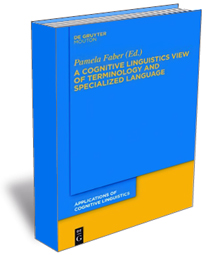 |
Authors: Pamela Faber, Clara Inés López Rodriguez, Carlos Márquez Linares, José Manuel Ureña Gómez-Moreno, Pilar León Araúz, Silvia Montero Martínez, Antonio San Martín Pizarro, Arianne Reimerink, Mercedes García de Quesada, and Juan Antonio Prieto Velasco. Publisher: De Gruyter Mouton Series: Applications of Cognitive Linguistics [ACL] 20 Place of publication: Berlin, Boston Publication date: July 2012 ISBN:978-3-11-027556-8 / 978-3-11-027720-3 |
Overview
Terminology and Cognitive Linguistics have common areas of focus. Topics such as conceptual structure, category organization, knowledge representation, and metaphor are relevant to both. This book shows how Cognitive Linguistics can be applied to specialized language within the context of Frame-based Terminology, a new cognitive approach to specialized knowledge units.
This book explores the importance of Cognitive Linguistics for specialized language within the context of Frame-based Terminology (FBT). FBT uses aspects of Frame Semantics, coupled with premises from Cognitive Linguistics to structure specialized domains and create non-language-specific knowledge representations. Corpus analysis provides information regarding the syntax, semantics, and pragmatics of specialized knowledge units. Also studied is the role of metaphor and metonymy in specialized texts. The first section explains the purpose and structure of the book. The second section gives an overview of basic concepts, theories, and applications in Terminology and Cognitive Linguistics. The third section explains the Frame-based Terminology approach. The fourth section explores the role of contextual information in specialized knowledge representation as reflected in linguistic contexts and graphical information. The final section highlights the conclusions that can be derived from this study.
Marie Claude L'Homme's review on the book
Excerpt: "The book is very useful for understanding the principles of Frame-based Terminology. Readers who are familiar with other recent approaches to terminology but less with FBT will certainly discover how recurrent issues such as conceptual structure, knowledge representation, metaphor and metonymy are dealt with this new framework. In addition, FBT is implemented in a resource - called EcoLexicon – containing a substantial amount of linguistic and graphical data. The resource puts the principles of FBT to the test and allows users to fully appreciate the extent to which they can be applied.
The book is well structured with abstracts at the beginning of each section and summaries at the end of chapters. An extensive list of references is provided at the end of the book. Readers interested in learning more about FTB can easily find other titles."
Complete review published in Terminology 19:2 (2013), 282-287.
Birte Lönneker-Rodman's review on the book
Review (in German) published in Zeitschrift für angewandte Linguistik. 60:1 (2014), 131–136.
Contents
1. Introduction (Pamela Faber)
2. Basic concepts
2.1 Terminology and specialized language (Pamela Faber, Clara Inés López Rodríguez)
2.2 Metaphor and metonymy in specialized language (Maribel Tercedor Sánchez, Clara Inés López Rodríguez, Carlos Márquez Linares, Pamela Faber)
2.3 Specialized language translation (Pamela Faber, José Manuel Ureña Gómez-Moreno)
3. Terms as specialized knowledge units
3.1 Specialized language semantics (Pilar León Araúz, Pamela Faber, Silvia Montero Martínez)
3.2 Specialized language pragmatics (Pamela Faber, Antonio San Martín Pizarro)
4. Contextual information in specialized knowledge representation: linguistic contexts and images
4.1 Contextual selection for term entries (Arianne Reimerink, Mercedes García de Quesada, Silvia Montero Martínez)
4.2 Graphical information (Juan Antonio Prieto Velasco, Pamela Faber)
5. Conclusions (Pamela Faber)
Preview
Useful links
|
Purchase A Cognitive Linguistics View of Terminology and Specialized Language and read excerpts at De Gruyter website |
|
Purchase A Cognitive Linguistics View of Terminology and Specialized Language
at Amazon: |
|
A Cognitive Linguistics View of Terminology and Specialized Language at Google Books |







